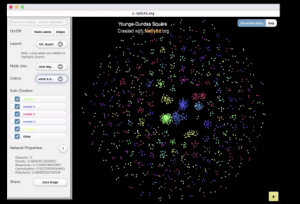H817-20b Block 4 – Activity 4 Part 2
“consider each of your areas of concern in turn and note whether learning analytics could potentially address this issue and, if so, how this might be done”
In this activity we are asked to analyse the PISA, OECD (2012) report comparing key metrics of two countries (including your own)
I have chosen to compare the UK and Italy in the 2012 PISA results. In the reported year students in the UK felt positive about school compared to Italy where one only third of students think things are ideal in their school.

Analytic data from social networks could be used, perhaps with a tool like Netlytic, described by Poquet et al. (2020) analyses text and social networks to create visualisations of online conversations. This platform can be used as an instruction or research tool. This may be invasive, I am not advocating such an approach. if it were used only on anonymised public posts it could perhaps be justified to discover what the main anxiety triggers were for students.
UK students reported high levels of anxiety about learning mathematics (although less anxious than OECD average) and a similar percentage in Italy feel the same way. A similar number of Italian students reported the same.
It may be possible to use some sort of modelling analytics to study the mathematical pedagogies in countries where low levels of mathematics anxiety are reported. It is likely that the techniques used to introduce mathematical concepts are different in other countries as reported by An et al. (2004).
The percentage of resilient (had beaten socio-economic disadvantage to succeed) students in the UK and Italy were around 7% in 2012.
It would be possible to use profiling of student backgrounds to identify in advance those from deprived backgrounds. The ethics and data protection issues raised by profiling mean this is unlikely to be a popular choice.
In the UK a quarter of students reported that they had skipped classes. In Italy the number was higher (35%).
It is possible to produce patterns of absences using data models which may suggest students are unhappy with particular subjects / teachers / days of the week / times. Perhaps there could be an intervention if a particular pattern emerged which could be addressed.
The UK in 2018
In the UK in 2018 the life satisfaction and positive feelings about school fell to some of the lowest levels in the OECD.
There are likely a number of reasons for this drop which may be discovered using UK wide financial, job market and other information. The increased use of social media and mobile technologies may also play a role in this.
I believe this would be too broad a subject to approach with one data science solution.
Newspaper Reporting
I was unable to source any Italian news stories about the PISA results, however I did find two UK articles. The first of these by Ringmar (2013) attempts to convince the reader that schools in Shanghai are “terrible” even though they score highest in the PISA report. The story claims that the educational system in China is elitist and abandons children who are not succeeding.
The second article, Agencies (2014) was a little more dry states that UK schools are more efficient than they are effective. It states that the educational system is cost effective in the UK but that this does not translate into higher results.
References
Agencies (2014) ‘Education system in UK ‘more efficient than effective”, The Telegraph, 5 September 2014. (Online) Available at https://www.telegraph.co.uk/education/educationnews/11076066/Education-system-in-UK-more-efficient-than-effective.html (Accessed 3rd July 2020)
An, S., Kulm, G. and Wu, Z., 2004. The pedagogical content knowledge of middle school, mathematics teachers in China and the US. Journal of mathematics teacher education, 7(2), pp.145-172.
OECD (2012) Programme for International Student Assessment (PISA) (Online). Available at http://www.oecd.org/ pisa/ aboutpisa/ pisa-2012-participants.htm (Accessed 3rd July 2020)
Poquet, S. And Chen B. (2020), Analyzing Learning and Teaching through the Lens of Networks. (Online), Available at https://www.youtube.com/watch?v=gEd95ILsBjc (Accessed 22nd April 2020)
Ringmar, S. (2013) ‘Here’s the truth about Shanghai schools: they’re terrible ‘, The Guardian, 28 December 2013. (Online) Available at https://www.theguardian.com/commentisfree/2013/dec/28/shanghai-china-schools-terrible-not-ideal (Accessed 3rd July 2020)